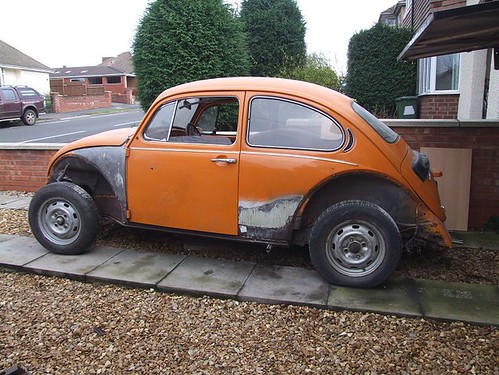
This is the current state of my Beetle, well apart from the rear tyres which are flat. Despite this, I can be sure it will be roadworthy by the end of May next year.
How come? Am I finally going to find the time to fix it? Have I come into money that will allow me to pay someone else to get it back on the road?
No.
It's simply that since it was built in 1973, next year, the Government has decided that it will no longer need a MOT test. If I get insurance, I can legally take it out on the road.
This will be a short journey. Basically, down the hill across the road at the bottom and into the hedge - what with neither brakes nor steering working.
Am I wrong, or is this just madness? I appreciate that most people in charge of a 40 year old car will be caring for it but there will be some that won't. A MOT isn't much to ask every vehicle to pass each year. How long before there is an accident involving an unsafe classic and the media are crying out for all old cars to be banned from the road?
Good grief, the Daily Mail headlined this story, "Rustbucket cars made before 1977 will be exempted from MOTs", so we'll be lucky to make it into the autumn before the ban.
Good grief, the Daily Mail headlined this story, "Rustbucket cars made before 1977 will be exempted from MOTs", so we'll be lucky to make it into the autumn before the ban.
4 comments:
The driver has a duty to ensure a vehicle is in a road worth condition at all times. An MOT doesn't guarantee a vehicle being "road worthy" beyond it leaving the MOT test station. The following day/week it could be un-roadworthy and yet still hold an MOT.
As for my own old vehicles, well the one has never had an MOT (being steam powered), the other I probably will still send in, at least occasionally, but that's beside the point. You could have a 2 year old car ice-skating around on bald tyres that's exempt from an MOT as well - age doesn't prevent a vehicle from being 'unsafe', and an MOT doesn't ensure a vehicle is safe (beyond the day of the test).
I can see where the concern with this is, not least from the media, but the small print for MOTs state that the car is deemed roadworthy at the time of inspection. It is still the responsibility of the owner to make sure the vehicle is roadworthy and I think in the hysteria, a lot of people are forgetting that inconvenient truth.
Proving "unroadworthy" will be the problem. At least having an MOT is a yes or no issue. Anything else is arguable if you have a good lawyer.
While I don't exactly enjoy the MOT experience, at least I know someone who is not me and who has no interest in quietly ignoring any problems has a good crawl around under the car. Since it's on a hoist then he gets a really good look at bits that are difficult to see normally.
Really serious classic car owners won't be affected by this - they spend hours polishing their vehicle, but there are a host of people who have a classic (VW camper people especially) who treat it like a modern car, wouldn't know one end of a spanner from the other and will simply drive on oblivious.
It would be interesting to see what happens to the cost of motor insurance for these old cars. It may suddenly become very expensive becasue, like you, the underwiriters are concerned about the potential risk of ancient cars without MOTs being on the road.
I suggest that likely outcome will be that if you delcare a maximum milage of, say, more than 500 per annum you will get stung in the wallet. That amount of miles will allow you to take your pride and joy to a few shows but will treks from London to Newquay and back in a split windscreen camper van a very expensive luxury.
The next risk is that because HMG is not longer interested in these vehilces e.g. No MOT and no VED (Road Tax)then some owners of such vehicles may not bother with insurance at all .......
Regards,
Geoff
Post a Comment